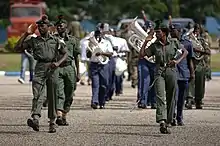Nigerian Army Band Corps
The Nigerian Army Band Corps (NABC) is the official military band branch of the Nigerian Army. It is roughly the equivalent of the Royal Corps of Army Music of the British Army, the Music Branch of the Canadian Forces, and the Australian Army Band Corps.
| Nigerian Army Band Corps | |
|---|---|
 Drum majors from the NABC during the Africa Endeavor 2008 opening ceremony. | |
| Active | 1932 - present |
| Country | |
| Branch | |
| Type | Military Band |
| Role |
|
| Part of | Directorate of Music |
| Headquarters | Ojuelegba, Lagos, Nigeria |
| Nickname(s) | NABC |
| Commanders | |
| Director of Music | Colonel O.G. Olaniyi[1] |
History
It was founded as a regimental band in 1932, with Captain J. Cooper from the Royal Life Guards Band in London originally leading the band. In 1935, the NABC was converted into a full-fledged military band, being part of the Royal West African Frontier Force (RWAFF). Two years before the country's independence in 1960, the band was transferred from its rehearsal space in Kaduna to Abalti Barracks in Lagos. As part of the government policy of the replacement British citizens with native Nigerians in public roles, Captain Cooper was replaced in 1964 by Lieutenant Colonel Josef Olubobokun (1930–2015), who became the first native Nigerian to lead the cops.[2][3][4] During his tenure, he would become instrumental in the establishment of institutions such as the Nigerian Army School of Music.[5][6]
Army School of Music
The Army School of Music (NASM) is a part of the corps that is also a branch of the Training and Doctrine Command (TRADOC). In 1987, the Nigerian Television Authority, at Victoria Island featured instructors from both the Nigerian Army and Navy Schools of Music on its educational program on various band instruments.[7]
Characteristics
Musical accompaniment provided by corps ranges from jazz and traditional music to military and classical music.[8] It order to be eligible to serve in the corps, one would have to be aged between 18 and 26, as well as have a height of 168 cm (5 ft 6 in) for male members (162 cm (5 ft 4 in) for female members) and a knowledge of Nigerian regional languages, aside from capability in playing musical instruments.[9]
Directors of Music
- Captain J. Cooper (1932-1964)
- Colonel Josef Olubobokun (1964-16 January 1984)[10]
- Lieutenant Colonel A.G. Ugwunze (16 January 1984-)[11]
- Lieutenant Colonel Timothy Eru
- Lieutenant Colonel Sati
- Brigadier General Luckson Amaechi
- Colonel Gerald Nwasike
- Colonel O.G. Olaniyi (11 December 2019-Till Date)
- Lieutenant Colonel A.G. Leku (19 February 2019-18 December 2019)[12][13]
- Lieutenant Colonel J. E Evans
References
- "Shakeup in Nigerian Army, new spokespersons appointed". 11 February 2019.
- "Corps & Services - Nigerian Army- Official Website". www.army.mil.ng.
- https://ngvotes.com/nigerian-army-band-corps-nabc/
- Collier, Gordon (2012). Focus on Nigeria: Literature and Culture. ISBN 978-9401208475.
- Olatunji, M. O. (2010). "The Biography of Col. J.A. Olubobokun a Foremost Nigerian Military Musician".
- Olatunji, M O (29 October 2007). "The biography of Col. J.A. Olubobokun a foremost Nigerian military musician". Research Review of the Institute of African Studies. 23 (1). doi:10.4314/rrias.v23i1.22966.
- Olátúnjí, Michael Olútáò (December 2012). "The Indigenization of Military Music in Nigeria Issues and Perspectives". Matatu. 40 (1): 427–446. doi:10.1163/18757421-040001028. ProQuest 1265771438.
- "Band Of The Nigerian Army - Fanfares". Discogs. 9 February 2017.
- "2018 Nigerian Army Recruitment: Musicians for Nigerian Army Band Corps". 5 January 2018.
- https://www.pressreader.com/nigeria/thisday/20151225/282299614133652
- School, Nigerian Army Education Corps and (1994). History of the Nigerian Army. Headquarters, Nigerian Army. ISBN 978-978-2145-36-9.
- "Army gets new spokesman, releases new posting". 11 February 2019.
- "Army gets new spokesman, others". 11 February 2019.